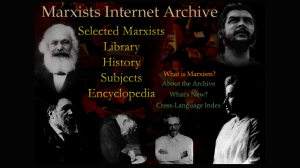In yesterday’s Irish Independent and on Facebook, Julien Mercille asks why The Workers’ Party, Socialist Workers Party, and the Socialist Party do not form one party.
The first answer a lot of people will reach for is simple inertia. Organisations have a momentum and direction that isn’t always easy to change, especially as the leading forces within the parties have got there because of that very approach.
But that isn’t the whole story.
The parties have historically had different political approaches, reflected in our different ideologies. Certainly the Socialist Workers Party & the Socialist Party are significantly less Trotskyist than they used to be, at least in their People Before Profit and Anti Austerity Alliance manifestations, while the WP is far from the force it was. In that respect all three lie closer to each other than at any other time in the past.
But the underlying political differences remain; they are not illusionary. The WP, for instance, does not share the SWP’s orientation towards assemblies; we are much more ‘partyist’ in our conception of how working class power can be built. This has a cascade of knock on effects in how we see struggle developing, with the SWP being significantly more spontaenist in how they see an anti-capitalist movement gaining traction, although their experience with PBP may be gradually altering that.
There isn’t, of course, any difficulty with discussing unity with any of them but that unity will only occur on the basis of ideological agreement, such as having historical materialism as the theoretical framework, the role of the party, the relative importance of control of production, being explicitly socialist etc. If it turns out that we are much closer on such theoretical issues than we had previously thought, the we can expect the parties to merge in a fairly rapid fashion. I would also expect it to be a durable outcome.
But simply tying the knot without sorting out fundamental ideology would lead in short order to an acrimonious split. At best you’d get a faction ridden organisation that fractures at the first point of stress. The difficulties are only multiplied if the net is cast wider, to include the Social Democrats and Sinn Féin even if that only comprised a loose alliance.
The mistake Julien, Rory Hearne, and initiatives like Right2Change make is to posit left unity as a matter of agreeing policy and some organisational structure, probably a loose one. It’s not. Policy is secondary; it comes *after* ideological unity and flows from it, as does the organisational form.
Finally, it is deeply unimpressive to be regularly lectured on the virtues of left unity by individuals who can’t even bring themselves to join *any* party. If one has such vehement views about the multiplicity of parties, pick the one that is closest to you and argue for left unity inside it. If the truth is so obvious, then it should be fairly straightforward work.
Setting oneself up at the left’s leadership in exile has approximately zero effect on members of these organisations, particularly when there is a total absence of understanding why the parties exist, how they conceptualise themselves, and the function of ideology in social organisations.












What about Eirígí and the IRSP?
Perhaps better to have a short order and acrimonious split than prolonged neoliberal order, divided struggle, and no chance of winning an election to reverse punishing austerity measures – just my two cents…
Even Marx had a less rigid understanding than the one put forward here – unity of ideology before struggle is antithetical to the historical development of social forces. To think that a truly ‘united’ Left (which has never existed in the history of struggle) will become a suddenly more realistic option than briefly putting aside, what in many respects have become arcane ideological debates that matter little to most in the working class, is a better strategy than trying to win an election, is precisely why the Left in Ireland is so underrepresented and belittled, while the Left in Portugal, Spain, and Greece have started to have at least some modicum of success in that they are regarded as a serious political force.
Debate is welcome, but at what cost does it limit united action and strategic maneuver?
Pingback: Left unity… | The Cedar Lounge Revolution
To Liam: the general point about the relevance of ideology applies to eirigi and the IRSP. In their case, I think it would be fair to say that Irish nationalism is an important part of their ideology. They would have significant differences with The Workers’ Party and the Socialist Party on that front. The IRSP directly and eirigi indirectly emerged from splits from the WP over that issue. Hard to see them agreeing on it at this stage and a very difficult one to fudge in Ireland.
To Ryan:
But there isn’t any argument that unity of ideology should be put before struggle, just that ideology is a key factor in unity, in this case the merging of three specific organisations. It cannot be neglected as it was in the article to which this post was written in reply.